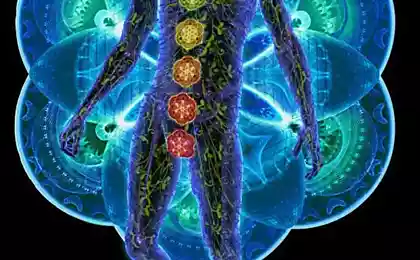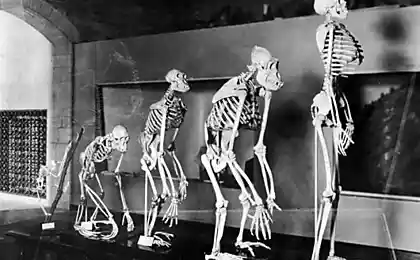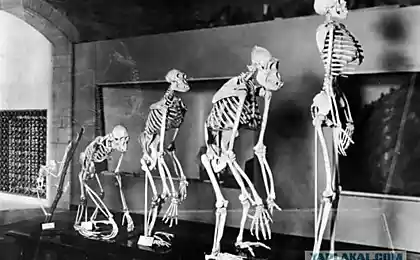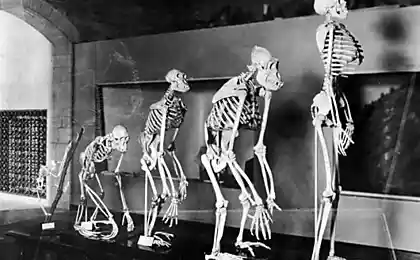499
10 not the most pleasant revelations about human nature
I want to believe that most of our readers still think people are beautiful creatures. We share this belief, but from time to time, the researchers give us the results of their experiments, revealing quite alarming facts about us. Here are a few examples:
1. People love dogs more than charity
Thirty two million seven hundred nine thousand one hundred forty seven
If you come back by accident found a wallet full of cash? This is a question that tried to answer the scientists from Edinburgh, adding a few extra conditions to make it interesting.
As an experiment, they scattered around the city a whole bunch of wallets with the fictional address of the owner. Together with the data owner researchers have placed in a wallet photo to see how it will affect the return of the money.
The images were different, ranging from newborn babies to cute little puppies and handsome older couples. For purity of experiment they left some wallets are generally without a photo and a few wallets with documents, which showed that the owner often and willingly gives money to charity.
The results in wrote many of the major media: a photo of a small child in the wallet most likely are able to get people to return the money. The results also showed that the wallets with information about donations returned much less than any other (except wallets, where in addition to the money and the address was nothing).
Wallets, talking about its owner as a zealous philanthropist, returned only 20 percent of cases, but the wallets with the picture of a dog returned to the "owner" in 53 percent of cases. For comparison, the wallets, in which was nothing but money and the address returned in 15 percent of cases. That is, you have 33 percent more likely to return your wallet if the person who found it decides that you like dogs more charity.
2. We give alms to feel better about yourself
Twenty three million forty four thousand eight hundred eighty six
Charity is a wonderful thing, if it comes from a pure heart. However, let us face it: many of us, giving to the needy fraction of their hard-earned, consider themselves worthy of praise and applause.
When several researchers at the University of Kent decided to find out what really motivates people to donate money to charity, the results were surprising. It was found that people tend to donate according to their preferences and dislikes. Some, for example, donate to a shelter for dogs simply because they hate cats.
In addition, if the person is not sacrificed for something really important, it is automatically justified by the fact that it does not coincide with his personal views, no matter how these views are justified. One of the respondents refused to send any money abroad, for example, the tsunami in Sri Lanka, because they thought that the money "will go to support Mugabe and such people."
No doubt, charity is a good thing, but agree: the fact that the most selfless thing a person can do, it is highly dependent on the personal interests and preferences, a little unsettling.
3. People are willing to turn off the road to collide with the animal
Twenty seven million three hundred ninety eight thousand seven hundred thirty seven
Every day you have the chance to face a man who could deliberately crushing road beast. In their experiment, mark Rober, NASA engineer, has posted on the side of the highway groups of rubber snakes, tarantulas and turtles to see what would happen.
Robert found that out of thousands of cars passed, not less than sixty was purposely trying to crush them. Drivers intentionally pulled over to kill the rubber animals. In 89 percent of cases it was a jeep.
On the other hand, a large number of people stayed to help animals. However, this does not deny the fact that seeing innocent little snake slithering about their business, about one in twenty people willing to risk their own lives just to destroy it.
4. Our security does not depend on the number of people around
Thirty five million seven hundred eighty four thousand eight hundred thirty
Bystander effect — a psychological effect, showing that people who witness an emergency situation (accident, crime or other), not trying to help the victims. Found that the more people were witnesses to the incident, the less likely that someone will rush to help the victims, instead of just stand and watch. Moreover, this effect works even if there is a threat to the lives of the "witnesses."
In a joint experiment of Columbia University and new York people are placed in the room under the pretext that they have to fill in a questionnaire. After some time in the room through the vent began to flow thick smoke. Surprisingly, despite real threat to his own life and the lives of others, the more people were in the room, the less were willing to ignore the smoke.
In some cases, people just sat there and continued to fill in the questionnaire, despite the fact that smoke started coughing and had watery eyes. When later asked about the reasons for the silence, it turned out, many just do not think that this could be a fire, and some even suggested that this "gas of truth."
5. Volunteers will work less if they pay
Eleven million eight hundred thirty eight thousand four hundred seventeen
The work of the volunteers, like charity, should be rewarded, but not money.
The researchers tested people's willingness to donate their time if they pay for it. Surprisingly, when people were offered a cash incentive, the amount of time that they could provide voluntarily, fell sharply.
In General this may indicate that people are nicer to do something good for free. It also suggests that the ability of the organization to increase the number of volunteers depends on whether the people desire to carry out this work free of charge.
6. We always associate the unknown character with a man
Eighty two million four hundred fourteen thousand eight hundred four
Gender inequality is a hot topic. Despite the overall education about sex discrimination, it turns out, is so embedded in our brains that we a priori believe that any unknown person is male, regardless of what they say to us various signs.
In the course of the last year of the experiment it was found that in the simulation by the computer of the human body most people automatically assumed that this man, even if they were offered a decidedly feminine silhouette.
If you are wondering why this is so important, think about the images of God that, in General, is beyond our imagination. He is always portrayed as a man. Remember that the word doctor also evokes associations with the man. This identification is automatic and really seems to be a problem for those who advocate equality of the sexes.
7. We easily convinces the authorities
Sixty million seventy five thousand three hundred ten
If you have ever heard of Milgram's experiments, you probably already know about the concept of submission to authority.
It's amazing how little power is necessary for the person to convince others to do evil. One of the most famous of Milgram's experiments, subjects were asked, being at a distance, through another person's body a small dose of electricity. When the voltage began to increase, "put to death" in the electric chair, the actor has asked to stop the experiment, although initially agreed.
Ordinary people involved in the experiment, expressed doubt about security "put to death" person, but all it took to continue – the man in the lab coat.
If you ask whether such obedience only to the men in white coats, no. An enterprising fellow from the UK unofficially conducted the same experiment, and found that it is enough to be dressed only in fluorescent vest.
8. We are not born equal
Eighteen million eight hundred sixty four thousand one hundred seventy six
Saying, "repetition is the mother of learning" is known to all. But in 2013, someone had the idea to verify this. And it turned out that no.
The experiment was raised to find out how quickly people can grasp the skills in music and chess, showed that hours of training does not always help to master. In other words, to achieve perfection, one practices only not enough innate ability and talent play a much more important role than many of us are accustomed to thinking.
The researchers stressed that the practice does allow in some way to master the desired skill, but the difference between "good" and "great" is not confined solely to practice. Largely it depends on whether the initially predisposed to this man. Thus, many children learning to play the guitar, hoping to reach the heights of the idol will never reach its goal.
9. We lie and twisted, when we feel not at ease
Fifty nine million six hundred forty seven thousand seven hundred seventeen
Factors such as sadness or low self-esteem make us do bad things – or at least more easily justify them.
One of the famous studies on this theory, began with the evaluation of personalities in the group of students with a small test, and continued the experiment in which they were given the opportunity to deceive another to earn.
The results showed that students who received positive responses on a personality test, was far less inclined to cheat than those whose responses were negative (e.g., if the test showed that they are uninteresting). Just think how often words are more hurtful and offensive than this estimate we hear in his address.
What is responsible for this relationship? The study showed that this is due to the so-called "differences in self-esteem". Basically, people with high self-esteem is more difficult to justify any immoral acts, because it goes against their idea of themselves. Much easier to justify, for example, false if you think nobody cares what you do.
10. We have less sympathy to other races
Seventy two million four hundred forty nine thousand three hundred fifty six
In Italy examined people's attitudes to others ' pain. For the experiment of white and black people were asked to view the clip, in which needles pricked his hands. Some hands on the screen were black, some white.
At this time, the researchers tracked brain activity and heart rate of the subjects. It was noted that both white and black participants reacted more strongly when the needle pricked the hands of their color.
To eliminate the possibility that participants simply reported their own hands, the clip also showed a bright purple hands. All participants had stronger emotions towards purple hands than the hands, not of their race.
Although the main objective of the experiment was to determine whether call doctors difficulty determining pain in a person of another race, suddenly found that we subconsciously carry out differences between the races emotionally.
Source: listverse.com/2013/05/26/10-studies-that-reveal-depressing-facts-about-humanity/
1. People love dogs more than charity
Thirty two million seven hundred nine thousand one hundred forty seven
If you come back by accident found a wallet full of cash? This is a question that tried to answer the scientists from Edinburgh, adding a few extra conditions to make it interesting.
As an experiment, they scattered around the city a whole bunch of wallets with the fictional address of the owner. Together with the data owner researchers have placed in a wallet photo to see how it will affect the return of the money.
The images were different, ranging from newborn babies to cute little puppies and handsome older couples. For purity of experiment they left some wallets are generally without a photo and a few wallets with documents, which showed that the owner often and willingly gives money to charity.
The results in wrote many of the major media: a photo of a small child in the wallet most likely are able to get people to return the money. The results also showed that the wallets with information about donations returned much less than any other (except wallets, where in addition to the money and the address was nothing).
Wallets, talking about its owner as a zealous philanthropist, returned only 20 percent of cases, but the wallets with the picture of a dog returned to the "owner" in 53 percent of cases. For comparison, the wallets, in which was nothing but money and the address returned in 15 percent of cases. That is, you have 33 percent more likely to return your wallet if the person who found it decides that you like dogs more charity.
2. We give alms to feel better about yourself
Twenty three million forty four thousand eight hundred eighty six
Charity is a wonderful thing, if it comes from a pure heart. However, let us face it: many of us, giving to the needy fraction of their hard-earned, consider themselves worthy of praise and applause.
When several researchers at the University of Kent decided to find out what really motivates people to donate money to charity, the results were surprising. It was found that people tend to donate according to their preferences and dislikes. Some, for example, donate to a shelter for dogs simply because they hate cats.
In addition, if the person is not sacrificed for something really important, it is automatically justified by the fact that it does not coincide with his personal views, no matter how these views are justified. One of the respondents refused to send any money abroad, for example, the tsunami in Sri Lanka, because they thought that the money "will go to support Mugabe and such people."
No doubt, charity is a good thing, but agree: the fact that the most selfless thing a person can do, it is highly dependent on the personal interests and preferences, a little unsettling.
3. People are willing to turn off the road to collide with the animal
Twenty seven million three hundred ninety eight thousand seven hundred thirty seven
Every day you have the chance to face a man who could deliberately crushing road beast. In their experiment, mark Rober, NASA engineer, has posted on the side of the highway groups of rubber snakes, tarantulas and turtles to see what would happen.
Robert found that out of thousands of cars passed, not less than sixty was purposely trying to crush them. Drivers intentionally pulled over to kill the rubber animals. In 89 percent of cases it was a jeep.
On the other hand, a large number of people stayed to help animals. However, this does not deny the fact that seeing innocent little snake slithering about their business, about one in twenty people willing to risk their own lives just to destroy it.
4. Our security does not depend on the number of people around
Thirty five million seven hundred eighty four thousand eight hundred thirty
Bystander effect — a psychological effect, showing that people who witness an emergency situation (accident, crime or other), not trying to help the victims. Found that the more people were witnesses to the incident, the less likely that someone will rush to help the victims, instead of just stand and watch. Moreover, this effect works even if there is a threat to the lives of the "witnesses."
In a joint experiment of Columbia University and new York people are placed in the room under the pretext that they have to fill in a questionnaire. After some time in the room through the vent began to flow thick smoke. Surprisingly, despite real threat to his own life and the lives of others, the more people were in the room, the less were willing to ignore the smoke.
In some cases, people just sat there and continued to fill in the questionnaire, despite the fact that smoke started coughing and had watery eyes. When later asked about the reasons for the silence, it turned out, many just do not think that this could be a fire, and some even suggested that this "gas of truth."
5. Volunteers will work less if they pay
Eleven million eight hundred thirty eight thousand four hundred seventeen
The work of the volunteers, like charity, should be rewarded, but not money.
The researchers tested people's willingness to donate their time if they pay for it. Surprisingly, when people were offered a cash incentive, the amount of time that they could provide voluntarily, fell sharply.
In General this may indicate that people are nicer to do something good for free. It also suggests that the ability of the organization to increase the number of volunteers depends on whether the people desire to carry out this work free of charge.
6. We always associate the unknown character with a man
Eighty two million four hundred fourteen thousand eight hundred four
Gender inequality is a hot topic. Despite the overall education about sex discrimination, it turns out, is so embedded in our brains that we a priori believe that any unknown person is male, regardless of what they say to us various signs.
In the course of the last year of the experiment it was found that in the simulation by the computer of the human body most people automatically assumed that this man, even if they were offered a decidedly feminine silhouette.
If you are wondering why this is so important, think about the images of God that, in General, is beyond our imagination. He is always portrayed as a man. Remember that the word doctor also evokes associations with the man. This identification is automatic and really seems to be a problem for those who advocate equality of the sexes.
7. We easily convinces the authorities
Sixty million seventy five thousand three hundred ten
If you have ever heard of Milgram's experiments, you probably already know about the concept of submission to authority.
It's amazing how little power is necessary for the person to convince others to do evil. One of the most famous of Milgram's experiments, subjects were asked, being at a distance, through another person's body a small dose of electricity. When the voltage began to increase, "put to death" in the electric chair, the actor has asked to stop the experiment, although initially agreed.
Ordinary people involved in the experiment, expressed doubt about security "put to death" person, but all it took to continue – the man in the lab coat.
If you ask whether such obedience only to the men in white coats, no. An enterprising fellow from the UK unofficially conducted the same experiment, and found that it is enough to be dressed only in fluorescent vest.
8. We are not born equal
Eighteen million eight hundred sixty four thousand one hundred seventy six
Saying, "repetition is the mother of learning" is known to all. But in 2013, someone had the idea to verify this. And it turned out that no.
The experiment was raised to find out how quickly people can grasp the skills in music and chess, showed that hours of training does not always help to master. In other words, to achieve perfection, one practices only not enough innate ability and talent play a much more important role than many of us are accustomed to thinking.
The researchers stressed that the practice does allow in some way to master the desired skill, but the difference between "good" and "great" is not confined solely to practice. Largely it depends on whether the initially predisposed to this man. Thus, many children learning to play the guitar, hoping to reach the heights of the idol will never reach its goal.
9. We lie and twisted, when we feel not at ease
Fifty nine million six hundred forty seven thousand seven hundred seventeen
Factors such as sadness or low self-esteem make us do bad things – or at least more easily justify them.
One of the famous studies on this theory, began with the evaluation of personalities in the group of students with a small test, and continued the experiment in which they were given the opportunity to deceive another to earn.
The results showed that students who received positive responses on a personality test, was far less inclined to cheat than those whose responses were negative (e.g., if the test showed that they are uninteresting). Just think how often words are more hurtful and offensive than this estimate we hear in his address.
What is responsible for this relationship? The study showed that this is due to the so-called "differences in self-esteem". Basically, people with high self-esteem is more difficult to justify any immoral acts, because it goes against their idea of themselves. Much easier to justify, for example, false if you think nobody cares what you do.
10. We have less sympathy to other races
Seventy two million four hundred forty nine thousand three hundred fifty six
In Italy examined people's attitudes to others ' pain. For the experiment of white and black people were asked to view the clip, in which needles pricked his hands. Some hands on the screen were black, some white.
At this time, the researchers tracked brain activity and heart rate of the subjects. It was noted that both white and black participants reacted more strongly when the needle pricked the hands of their color.
To eliminate the possibility that participants simply reported their own hands, the clip also showed a bright purple hands. All participants had stronger emotions towards purple hands than the hands, not of their race.
Although the main objective of the experiment was to determine whether call doctors difficulty determining pain in a person of another race, suddenly found that we subconsciously carry out differences between the races emotionally.
Source: listverse.com/2013/05/26/10-studies-that-reveal-depressing-facts-about-humanity/
Qigong — 12 is a simple and effective health and exercise
Environmentally friendly resorts in Turkey























